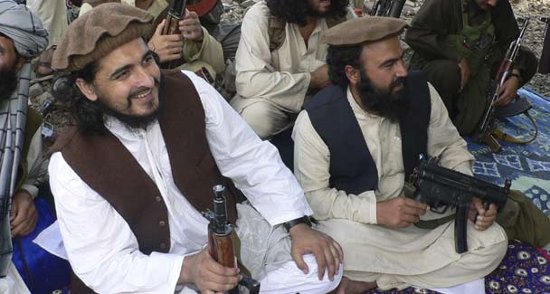
|
| Hakeemullah and Waliur Rehman Mehsud, before the Pakistani Army launched the South Waziristan offensive. |
The Movement of the Taliban in Pakistan's top spokesman, Ihsanullah Ihsan, confirmed today that Waliur Rehman, the group's deputy leader and emir in South Waziristan, was killed in a US drone strike yesterday. The Taliban vowed to avenge his death and also withdrew the prospects of peace talks with the newly elected Pakistani government.
Rehman, his deputy Fakhar-ul-Islam, and two Uzbeks were among seven people killed in yesterday's strike at a compound in the village of Chashma just outside Miramshah in North Waziristan. The attack took place in an area administered by the Haqqani Network, the Pakistani Taliban subgroup that is backed by Pakistan's military and Inter-Services Intelligence Directorate and is closely allied with al Qaeda and other terror groups in the region. While the Haqqani Network is not officially part of the Movement of the Taliban in Pakistan, it closely works with the group and shelters its leaders and fighters in North Waziristan.
The strike was the first in Pakistan in six weeks, and the first since Nawaz Sharif and his Pakistan Muslim League - Nawaz political party came out on top in Pakistan's parliamentary election on May 11. Sharif has indicated he wished to negotiate with the Movement of the Taliban in Pakistan to end years of fighting in Pakistan's tribal areas and the greater northwest.
Ihsan confirmed Rehman's death during an interview with Dawn, and noted that any chance of talks with the government have died along with Rehman.
"We are suspending all kinds of contacts and revoke the peace talks offer with the government, soon we shall be responding with full force," Ihsan said.
"On one hand the Pakistani government is advocating the mantra of peace talks, and on the other it is colluding with the United States and killing the Taliban leadership," he continued.
While Pakistani news outlets have reported that a commander known as Khan Said and Sajana Mehsud succeeded Rehman, Ihsan told Dawn that a replacement has not yet been named as the group's shura, or executive council, must meet before a decision is made.
"No I can not confirm yet, who will be taking over, the Taliban shura has not decided about it yet," Ihsan told Dawn.
For years, Rehman, an influential and respected leader in the Mehsud tribe in South Waziristan, served as both the deputy to Hakeemullah Mehsud and the group's emir in the tribal agency. He has been involved in multiple terror attacks inside Pakistan and in neighboring Afghanistan, including the suicide attack at Combat Outpost Chapman at the end of December 2009 that killed seven CIA personnel, as well as in the failed Times Square car bombing in New York City on May 1, 2010.
The US Treasury Department added Rehman and Hakeemullah to the list of Specially Designated Global Terrorists in September 2010, the same time that the Movement of the Taliban in Pakistan was named as a Foreign Terrorist Organization. The US also put out a $5 million reward for information leading to their capture and prosecution.
The Pakistani government placed an estimated $600,000 bounty out for Hakeemullah and Waliur in the fall of 2009. Both men are wanted for terrorist attacks against the military, police, the government, and civilians inside Pakistan. Despite the bounties for Hakeemullah and Waliur, and 18 other Taliban leaders, only one has been killed and another has been captured.
In recent years, the Pakistani government routinely claimed that Rehman and Hakeemullah were at odds, and sometimes violently so. For instance, government officials alleged that the two Taliban emirs tried to kill each other during a meeting to name the successor to Baitullah Mehsud, the emir who was killed in a US drone strike in August 2009. The two Taliban leaders denied the clash ever took place, and have appeared in Taliban propaganda seated side-by-side in an effort to dispel the government claims.
The US has killed two senior Taliban leaders in Pakistan's tribal areas this year. In January, the drones killed Mullah Nazir, who led the Taliban faction in the Wazir areas of South Waziristan. He identified himself as an al Qaeda leader and waged jihad in Afghanistan. Although he was not a member of the Movement of the Taliban in Pakistan, Nazir, like the Haqqanis, has provided shelter and support for the group.